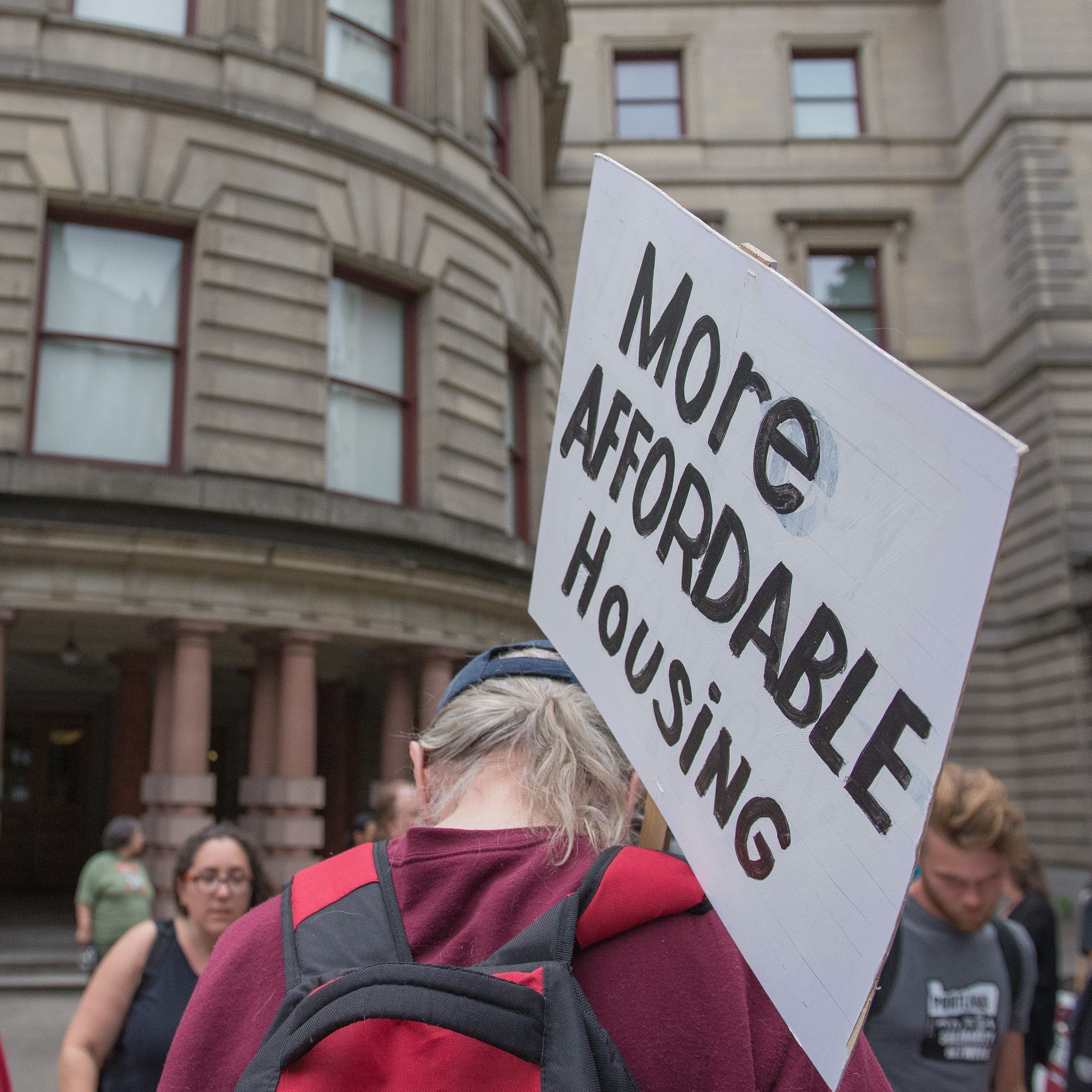Portland has a serious housing crisis on our hands. But recent victories by housing advocates at the city, county, and state level show that the problem is not insurmountable.
You’ve likely already heard the staggering statistics: Over 50% of Portlanders can’t afford their rent. Federal funding for affordable housing development in Oregon has been cut in half since 2010. Rents in Portland have increased over 20% during the last five years. The average rent for a one bed apartment now exceeds $1,200 a month.
I could go on, but if you’re one of the many renters trying to find housing on a working class income or who’ve had their rent increased by 20, 40, 100 percent, or really, if you’re anyone who isn’t completely detached from the zeitgeist, these numbers are old news. In fact, local media outlets have been sounding the alarm for months, with hundreds of stories on the topic published by Portland newspapers since July.
The real news is that despite being up against moneyed interests, affordable housing advocates can and are creating the political will needed to solve our housing crisis.
By combining efforts, grassroots activists and local housing organizations are building a sophisticated, successful, collaborative movement, and this movement is gaining ground. Several vigorous campaigns by broad coalitions have resulted in big wins, and they are poised to bring home bigger victories in the near future.
What follows is a high-level recap of these winning efforts, a little silver lining about the failed repeal of Oregon’s ban on inclusionary zoning, and information on how to plug-in to the next campaigns coming down the pipeline.
State Level Successes
Despite not lifting the ban on inclusionary zoning, housing advocates made significant advances in the 2015 Legislative Session, including an unprecedented $60 million in new affordable housing funding.
In addition to ratcheting up the pressure using press releases, emails, social media, and rallies, advocates hosted two Housing Opportunity Days where over 250 Oregonians told their legislators to prioritize housing. Oregon Housing Alliance also held one of the most unique campaigns of the session – 20,000 pairs of socks stacked in front of the Capital to represent the number of kids who experienced homelessness during the last school year.
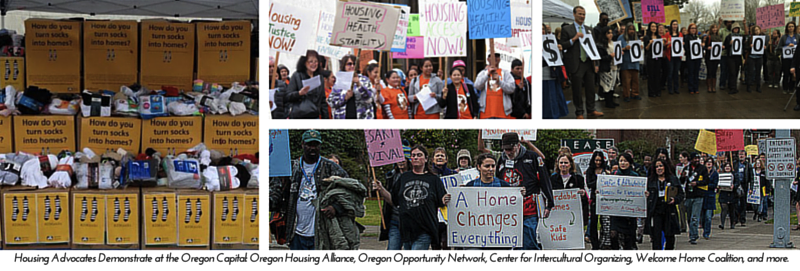
[expand title=”Additional Land for Affordable Housing” ]
When the 2013 inclusionary zoning repeal bill that he co-sponsored lost traction in the Senate, Representative Jeff Reardon, a democrat from Portland, decided to try a different approach – forming a legislative work group to study “housing affordability, balance and choice.” The workgroup, co-chaired by Representative Julie Parrish, a West Linn Republican, was charged with creating a package of legislative recommendations for the 2015 Legislative Session that had consensus from all workgroup members, including both the Oregon Home Builders Association and affordable housing advocates, like Neighborhood Partnerships and Opal Environmental Justice Oregon.
Out of these recommendations came HB 3524, which, starting in January 2016, will require state agencies to give nonprofit developers of affordable housing and local governments the first opportunity, after other state agencies, to purchase surplus state land. The law also requires all state agencies, except for the Department of Transportation and the Department of State Lands, to offer for sale any property that isn’t being used for a public purpose and isn’t needed for public use within the next five years. [/expand]
[expand title=”Easing the “Benefits Cliff” for Low-Income Renters“]
HB 3082, created by Portland Community Reinvestment Initiatives (PCRI) and carried by Representative Frederick and Senator Shields, both Portland Democrats, allows local jurisdictions the option of extending property tax exemptions to nonprofit owned residences when existing renters’ incomes rise above 60% Area Median Income (AMI), but do not exceed 80% AMI.
Prior the passage of this bill, if a family’s income rose even $1 above the 60% AMI threshold required for their initial occupancy of their rental, the nonprofit housing provider would lose their tax exemption for the unit and would be forced to either evict the tenant, raise the rent, or absorb the cost of the reinstated property taxes.
By allowing low-income families that have had modest income increases to stay in their housing, HB 3082 provides them the ability to save towards self-sufficiency. [/expand]
[expand title=”Affordable Housing & Rental Assistance Funding“]
The biggest housing advancement made during the 2015 legislative session was the allocation of additional $72.25 million for affordable housing and programs, comprised of:
- $9.75 million from the general fund for the Emergency Housing and State Homeless Assistance Program
- $2.5 million in lottery-backed bonds to preserve currently affordable homes
- $20 million in lottery-backed bonds to build homes for people with mental illnesses
- $40 million in general obligation bonds to develop affordable housing for families earning less than 60% of the area median income.
Although worth celebrating, this allocation is only a portion of the $100 million bond proposal put forth by Governor Kate Brown and the $300 million housing advocates estimate the state needs to be spending annually to meet it’s affordable housing need. It also seems small when compared to other recent investments by the legislature, like the $200 million allocated to OHSU to help them meet their Knight Cancer Challenge.
The flexibility of this state funding, as compared to highly regulated federal funds, will allow builders and developers to innovate and create modest housing at a lower cost. Additionally, advocates are confident that the successes from this first wave of housing development will spur expansion of funding in future years. [/expand]
| IZ Failure in The 2015 State Legislature - What Happened? Since the ban on mandatory inclusionary zoning was put in place in 1999 due to the lobbying of the Oregon Homebuilders Association, there have been over 5 attempts to repeal it. Before 2015, none of bills made it out of committee to be voted on by either the House or the Senate. This past legislative session, due to the leadership of House Speaker Tina Kotek and Representatives Keny-Guyer and Williamson, an amended repeal of the ban was passed by the House and was poised to pass in the Senate too. Once in the Senate, however, the bill languished in the Rules Committee. Senate leadership claimed the bill didn’t have the needed votes. Advocates argued that the bill would have gotten the 16 votes it needed, except that some more moderate democrats didn’t want to be put in the position of having to take a stance on the measure, particularly as they were planning to run for Oregon Secretary of State. The good news for housing advocates is that the bill will be back for the 2016 short session and even opponents admit the strong chance of the ban being lifted. |
Metro & County Victories
[expand title=”Metro Prioritizes a Regional Approach to Affordable Housing“]
Metro’s recently launched Equitable Housing Initiative is leading a regional discussion about the best ways to preserve and create quality affordable housing throughout the metropolitan area. The $200,000 effort, partnered with the Oregon Opportunity Network, will host a regional equitable housing summit this fall, a technical assistance program to help jurisdictions tackle short-term opportunities to support equitable housing, and the development of a long-range strategy for funding affordable housing. Workgroup members include Home Forward, NAYA, Community Partners for Affordable Housing, and others. [/expand]
[expand title=”Powell-Division Transit & Development Project Explores Anti-Displacement Strategies“]
East Portland activists asked Metro to consider several policies to prevent gentrification in the proposed high-capacity transit corridor between Portland and Gresham and have seen those policies incorporated into Metro’s draft Portland Action Plan, released in May, 2015. Policies include:
- Seeking funding for affordable housing development and preservation in the corridor and capitalizing on a Housing Land Bank/Trust Fund for investments in the corridor.
- Designing a program to update and preserve existing private multi-dwelling housing and affordability.
- Exploring the costs and benefits of establishing a Just Cause Eviction Policy.
- Exploring the establishment of an anti-displacement tax deferral for long-term qualifying residents who would like to remain in the corridor, but cannot manage increased tax burdens.
[/expand]
[expand title=”A Home for Everyone Initiative Includes Funding for Affordable Housing“]
Earlier this year, A Home For Everyone, the multi-jurisdictional initiative led by Multnomah County, the City of Portland, the City of Gresham, and Home Forward, released their funding and policy recommendations for reducing homelessness in Multnomah County by 50% by the end of 2017 and ending veterans homelessness by the end of 2015.
The group, which included service providers, activists, bureaucrats, and business leaders, called for $33 million in new funding over the next two years. Included in this amount was $20 million ($10 million each year) to develop an additional 500 new units of affordable housing.
With the support of advocates, Multnomah County dedicated an additional $5 million for affordable housing development and the City of Portland included $2.5 million for the Housing Investment Fund – for a total of 7.5 million out of the $10 million the committee requested. [/expand]
Advocates Make Gains in Portland
[expand title=”Incentivizing Affordable Housing Development“]
One of the primary ways that the City of Portland incentivizes the development of affordable housing is through the Multiple-Unit Limited Tax Exemption (MULTE) program. The program works by providing a 10-year property tax exemption for new multifamily developments, in exchange for at least 20% of those units being below market rate for the 10-year period.
With the support of the Oregon Opportunity Network, the Portland City Council recently approved tripling the cap on foregone property tax revenue available from $1 million to $3 million a year. This change, coupled with making the process non-competitive, is expected to increase the number of developments using the program and accordingly produce more affordable housing for people making above 60% or 80% AMI.
A second incentive the city currently uses to increase affordable housing is the Central City Floor Area Ratio (FAR) Bonus. Currently projects in certain parts of the city can earn density through the inclusion of various amenities including green roofs, bike lockers, water features, open space, and affordable housing. This past July, Portland City Council directed staff to prepare proposed legislative changes to this bonus system to better support affordable housing development and other targeted public benefits. The change, which won’t get final approval until summer 2016, will likely make affordable housing the primary type of public benefit developers could provide in exchange for increased density. [/expand]
The Next Big Push
Local housing advocates have wasted little time celebrating their recent successes and instead have moved forward with their next round of campaigns. With summer coming to an end, we encourage interested neighbors to participate in one of the many upcoming opportunities to keep Portland a place where everyone can afford to live.
Increasing the Amount Urban Renewal Funding Headed for Affordable Housing
Because creating housing for people at very low incomes will never pencil out for for-profit developers, public funding is required to develop housing for families making less than 60% AMI. Currently, Portland only has one dedicated local source of affordable housing funds – a 30 percent set-aside of urban renewal funds through tax increment financing (TIF). The set-aside requirement, which was created in 2006, has generated over $150 million for affordable housing since it’s inception. However, as total urban renewal funds decrease and many neighborhoods face doubling housing costs, advocates are pushing for to increase the set-aside to 50%.
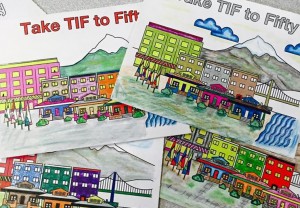 Through their #TakeTIFto50 campaign and with the support of other advocacy organizations like Housing Land Advocates, the League of Women Voters of Portland, Coalition of Communities of Color, the Metropolitan Alliance for Common Good, and the Welcome Home Coalition, which is endorsed by over 100 community organizations, received the support of the Portland Housing Advisory Commission, which unanimously approved recommending that City Council increase the affordable housing set-aside to 50%.
Through their #TakeTIFto50 campaign and with the support of other advocacy organizations like Housing Land Advocates, the League of Women Voters of Portland, Coalition of Communities of Color, the Metropolitan Alliance for Common Good, and the Welcome Home Coalition, which is endorsed by over 100 community organizations, received the support of the Portland Housing Advisory Commission, which unanimously approved recommending that City Council increase the affordable housing set-aside to 50%.
The recommendation will be going before the Portland Development Commission Board on September 9th and then to City Council on October 21st. Join the Welcome Home coalition in their efforts at www.welcomehomecoalition.org or follow @WelcomeHomeOrg.
Building Political Momentum for Additional Local Funding
Even if Portland City Council approves increasing TIF to 50%, it will not be enough to meet all of Portland’s affordable housing needs. Multnomah County currently has a deficit of over 23,000 housing units affordable for those earning between zero and 50 percent AMI.
Market based incentives are not going to produce housing affordable to this most vulnerable group of Portland residents. To make Portland a place that everyone can call home, Portland needs an estimated public investment of $50 million a year for the next 20 years. The Welcome Home Coalition is leading the charge for new dedicated local revenue streams to fill this gap.
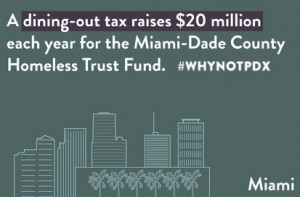 Because the most common funding mechanisms used in other cities are banned in Oregon, including real estate transfer taxes, construction excise taxes, and new document recording fees, the group has had to dig a little deeper but they’ve found at least four other cities using tools that Portland could use. They are highlighting other cities’ methods for funding affordable housing and pressing Portlanders to consider those methods via a social media campaign using the hashtag #WhyNotPDX?
Because the most common funding mechanisms used in other cities are banned in Oregon, including real estate transfer taxes, construction excise taxes, and new document recording fees, the group has had to dig a little deeper but they’ve found at least four other cities using tools that Portland could use. They are highlighting other cities’ methods for funding affordable housing and pressing Portlanders to consider those methods via a social media campaign using the hashtag #WhyNotPDX?
Right now, they’re considering a few different possibilities, including a dining tax,development impact fees, general obligation bonds and property tax levies. Whichever they move forward with, they want it to raise a minimum of $20 million a year.
In addition to pushing for a substantial dedicated revenue stream, the Coalition is also about to partner with neighborhoods concerned about the loss of affordability caused by demolitions calling for a new local tax on this high-end development trend. Portland’s current residential demolition permit fees range from $320 to $345 per site. Adding an impact tax, they argue, would disincentive demolitions, which often replace affordable housing with more expensive housing, and could be used to fund affordable homeownership programs. This new demolition tax is an example of the small tools advocates say we need to deploy immediately while we work together towards much bigger housing solutions.
Holding City Hall Accountable for Anti-Displacement Language in the Comprehensive Plan
A coalition of 30 local organizations, Anti-Displacement PDX, has been up to its elbows in wonky city-planning language for the past year, rallying for the inclusion of anti-displacement language in Portland’s Comprehensive Plan update, which sets the framework for how our city will grow over the next 20 years.
Through grassroots lobbying and demonstrated community support, the group’s package of 11 measures aimed at preventing further displacement of low-income residents and people of color from their neighborhoods was unanimously adopted by Portland’s Planning and Sustainability Commission. Key provisions include gentrification impact analyses for new infrastructure and significant new development, tenant protections, land banking, and community benefit agreements.
The draft Comprehensive Plan now moves to City Council for public hearings, deliberation, and a final vote. And the coalition is mobilizing Portlanders to keep the pressure on to ensure the City Commissioners and the Mayor keep their policy package in the final plan.
With hearings beginning November 19th, Anti-Displacement PDX encourages folks to wear pink, and get ready for direct actions like parties and press conferences as the City puts the next 20 years of policy in place. Find more about this group and when to show up for their fun events at facebook.com/antidisplacementpdx.
Evictions, Rent Increases, and a Renter State of Emergency
In Oregon, tenants on a month-to-month lease, or nearing the end of a long-term lease can be forced to leave even if they have not violated their rental agreement and have been paying their rent on time every month. Landlords only need to give 30 days notice, or 60 days if they’ve lived in the residence for more than a year, and don’t have to reveal their motive for the eviction. To top it all off, there are no rules limiting the amount by which landlords can raise rents.
Portland’s tight rental market and lack of renter protections have resulted in an unprecedented number of building-wide evictions, extreme rent hikes and what the Community Alliance of Tenants (CAT) is calling a ‘Renter State of Emergency.’
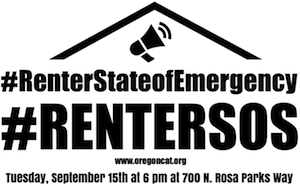 In response, CAT is launching a critical response campaign to call on local elected officials to implement immediate, temporary measures until long-term solutions can be achieved. Their specific policy demands will be announced at their press conference on September 15th, and could include increasing the amount of notice time required for no-cause evictions, increasing the amount of notice time required for rent increases, limiting the reasons for which a landlord can evict a tenant, or requiring landlords to cover some of the moving costs for no-cause evictions.
In response, CAT is launching a critical response campaign to call on local elected officials to implement immediate, temporary measures until long-term solutions can be achieved. Their specific policy demands will be announced at their press conference on September 15th, and could include increasing the amount of notice time required for no-cause evictions, increasing the amount of notice time required for rent increases, limiting the reasons for which a landlord can evict a tenant, or requiring landlords to cover some of the moving costs for no-cause evictions.
Renters are encouraged to join the conversation by publicizing their own stories of evictions, rent hikes, and displacement using #RenterStateofEmergency or #RenterSOS and at oregoncat.org/emergcy.
Stakes are high for thousands of residents across Portland who spend more than half of their income on rent, or worse, cannot find a home where they can afford to live. At the same time, government leaders, community organizations and everyday citizens are putting up a substantial fight. Whether you choose to show up at a public hearing, share your story, build momentum via social media or call your representatives, you’ll be in good company making a difference for the people and place we call home. Now is the time to make your voice heard and to elevate the voices of others.
By: Kelly Fedderson
Community Resource Program Manager
Southeast Uplift Neighborhood Coalition
(503) 232-0010 ext. 312
kelly@seuplift.org
